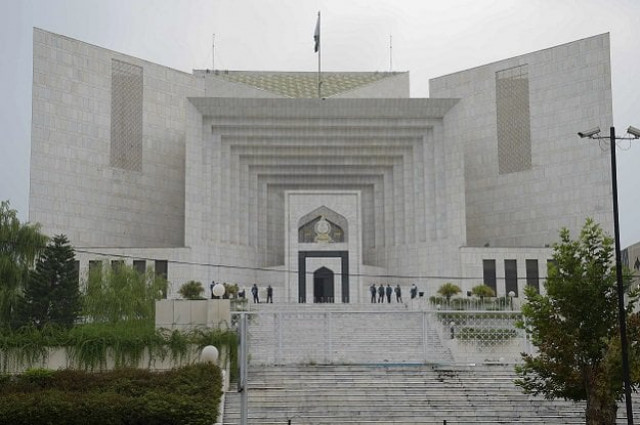Sindh govt puts a question mark over SC's Panama verdict
Says the Supreme Court should regulate its suo motu jurisdiction

Supreme Court of Pakistan. PHOTO: AFP
Sindh advocate general on behalf of the Sindh government has submitted a comprehensive reply in a case related to the judicial reforms in the country.
The reply has relied on paper submitted by Advocate General Sindh in three days International Judicial Conference to highlight key aspects which have contributed the deadlock of pending cases as well as strategies overcome such deadlock and achieve expeditious and inexpensive justice.
SC forms Panamagate-style JIT to probe fake accounts case
“Previously it was a settled law that failure to mention any asset or liability would not result in disqualification of the candidate unless the misstatement was ‘material particulars’ such that ‘it otherwise would automatically expose you to a disqualification’.
“For example being a loan defaulter of over two million rupees is a disqualification in itself and if such fact is not disclosed and concealed it would be treated as a misstatement in material particulars whereas on the contrary ownership in respect of any property (regardless of value or size) is not a disqualification in itself and any failure to declare the same would thus be treated as an honest mistake,” it says.
The provincial government, however, contends that the Panama Papers judgment did not take into consideration these aspects, although disqualification of Nawaz Sharif was made on the basis of misstatement in respect of declaration of assets and liabilities.
SC starts proceedings for Dar’s repatriation
“Can you be disqualified on account of a trivial error in respect of your bank accounts or property or would it be termed as an honest mistake and not a misstatement in material particulars,” it asks.
It says grey areas have occupied almost every area of law and with such grey areas comes uncertainty and with uncertainty comes litigation. It has requested the SC to consolidate the conflicting judgements and eradicate grey areas one by one.
The Sindh government says the judiciary is itself not complying with the special laws. A classic example would be election laws. The Representation of the People Act 1976 and now the election Act 2017 mandate that the election disputes are only to be decided by the election tribunals.
“However, it is a matter of routine that the jurisdiction of high court under Article 199 of the Constitution is invoked even in election disputes notwithstanding the bar contained in Article 225 of the Constitution as well as election laws,” it adds.
As new judicial year begins, superior judiciary to face serious challenges
The reply says it is a matter of record that the election disputes often become infructuous on account of assemblies having completed their tenure. “There are numbers of tribunals, which are constituted for speedy disposal of cases [but which] have been redundant due to variety of factors with the result that goal of expeditious and inexpensive justice have been failed to achieve.
The Sindh government says there should be a complete ban on call for strike, which is blatant defiance of fundamental rights. “Those who say that charity begins at home must still be mocking as to why watchdog has failed to watch its own field”
It also questions who will watch the watchman. It says the Supreme Court should regulate its suo motu jurisdiction, ‘which is presently unregulated’. The Sindh government has also urged that cost system should be imposed to decrease institution of frivolous cases. Interlocutory applications must be regularised and these should be decided in maximum period of six weeks, it adds.



















COMMENTS
Comments are moderated and generally will be posted if they are on-topic and not abusive.
For more information, please see our Comments FAQ